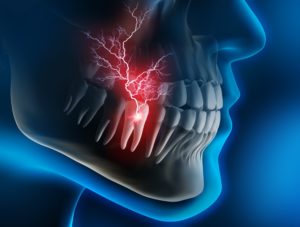 If you have a toothache, it can be difficult to focus on anything else, especially at night. If it seems like your pain intensifies after going to bed, you’re not imagining it. Dental discomfort can worsen at night for many reasons, but you don’t have to lie in bed tossing and turning. Here’s what’s behind your pain and what you can do to manage it to get some shuteye.
If you have a toothache, it can be difficult to focus on anything else, especially at night. If it seems like your pain intensifies after going to bed, you’re not imagining it. Dental discomfort can worsen at night for many reasons, but you don’t have to lie in bed tossing and turning. Here’s what’s behind your pain and what you can do to manage it to get some shuteye.
Why Are Toothaches Worse At Night?
Contrary to common belief, an occasional toothache isn’t normal. In fact, it’s a sign of an untreated issue lingering in your mouth. It’s best to see your dentist as soon as possible to identify the source of your discomfort to provide appropriate treatment.
In the meantime, you can manage your pain at home by avoiding certain triggers. Dental pain can intensify after calling it a day for 4 common reasons:
1. Fewer Distractions
There are few distractions at night, making it easier to focus on the discomfort in your mouth. The human brain can only focus on so many things at any given time. As you’re trying to fall asleep, there’s less to distract you from your toothache.
2. Grinding and Clenching
Bruxism is a subconscious habit of grinding or clenching your teeth. Without a nightguard, friction can cause your teeth to ache at night. It’s not uncommon to have jaw or facial pain, too.
3. What You Ate for Dinner
The foods and drinks you have before going to bed can trigger pain, like those that are acidic, hot, or cold. Hard and chewy foods can also lead to discomfort.
4. Blood Circulation
Laying down causes your blood to rush to your head, which increases your blood pressure. The extra force can cause a painful tooth to throb relentlessly.
Managing a Toothache at Night
You don’t have to lose sleep focusing on dental pain. Here are a few easy ways to manage your toothache, so you can get some sleep:
- Avoid any hot, cold, or acidic foods and drinks before going to bed.
- Eat softer foods and avoid late-night snacking.
- After brushing and flossing, rinse your mouth with salt water to kill bacteria, reduce pain, and decrease inflammation.
- Take an OTC pain reliever.
- Apply a cold compress to the area to numb it.
- Sleep with your pillow elevated to prevent blood from pooling in your head.
Although you can manage toothaches at home, don’t wait to see your dentist. Delaying care can cost you your tooth. Your dentist will pinpoint the source of your pain and to provide the relief you need using a personalized treatment plan.
About Dr. Richard Mullens
Dr. Mullens earned his dental degree at the University of North Carolina and has regularly continued his education in advanced specialties, like full mouth rehabilitation, dental implants, and emergency dentistry. He is a member of many professional organizations, including the American Dental Association. If you have a toothache, request an appointment through our website or call (904) 441-6560.
